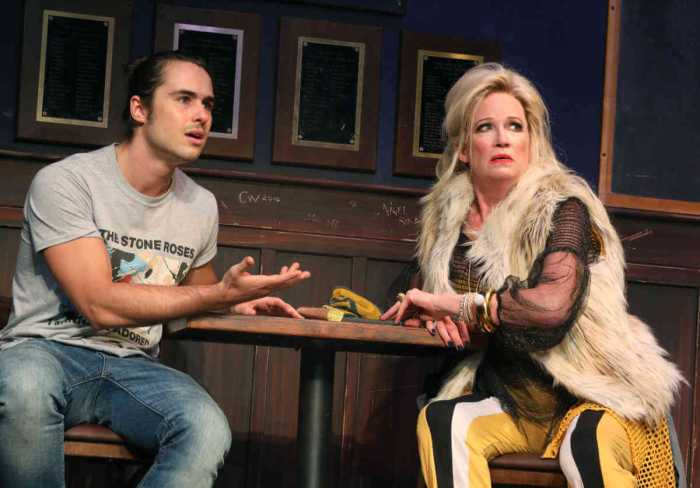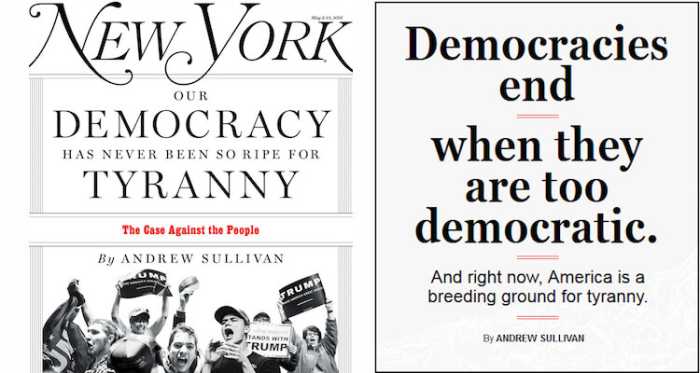Faye Marsay, George MacKay, Joseph Gilgun, and Paddy Considine with Ben Schnetzer (holding the megaphone) in “Pride,” directed by Matthew Warchus. | CBS FILMS
A feel-good film, “Pride” chronicles the efforts of an LBGT group to raise money to support striking Welsh miners in 1984. This rousing period drama, based on a true story, shows the power of activism and how the LGBT community found common cause with another marginalized group in Margaret Thatcher’s Britain.
The film, directed by Matthew Warchus and written by Stephen Beresford, introduces its queer characters first. Joe (George MacKay) is a closeted 20-year-old student who lives at home. At a gay pride march that June, he is unexpectedly asked by Mike (Joseph Gilgun) to help hold a banner. He soon becomes part of a makeshift family that includes Mark (Ben Schnetzer) the group’s leader, and Steph (Faye Marsay), its lesbian member, as well as Jonathan (Dominic West) and his lover Gethin (out gay Andrew Scott), a Welsh man who owns the Gay’s the Word bookstore, where the group meets.
As AIDS descends on ‘80s Britain, gays rally to miners’ cause
On Mark’s direction, this ragtag group of queer activists creates Lesbians and Gays Support the Miners (LGSM) and donates funds they raise to the Dulais Valley miners in South Wales. When Dai (Paddy Considine) pays the LGSM group a visit in a gay club, his thank you goes over well. However, when LGSM in turn travels to the Dulais miners’ welfare club, Mark’s speech falls on deaf ears. Some members of the miners’ community, including Hefina (Imelda Staunton), Cliff (Bill Nighy), and Sian (Jessica Gunning) appreciate the LGSM’s efforts, but Maureen (Lisa Palfrey in a one-note role) is a union leader who strongly objects to the gay group’s support. A battle of wills quickly escalates.
“Pride” shows, in slick, inspirational-movie fashion, how LGSM bonded with a very different community of people and lent the miners and their wives knowledge of the law that helped get the strikers out of jail. Jonathan’s moves on the welfare club’s dance floor, meanwhile, prompt more than one straight miner to ask for a lesson.
For their part, the queer contingent gains in their sense of self-worth –– Joe becoming emboldened as a gay man and Gethin moved to make amends with his mother, whom he has not seen in 16 years.
Many of the film’s scenes play on stereotypes, but what is important in the story is the lesson –– heartfelt –– of different communities finding shared strength against a common enemy. When Mark’s passion inspires a woman at a meeting to perform a stirring rendition of “Bread and Roses,” the moment emphasizes how morale can be as important as money. Even if the scenes are preachy, they go down smoothly.
“Pride” also includes some easy laughs, as when Hefina, staying at Gethin and Jonathan’s place, finds a dildo and dirty magazines, or when several elderly Welsh women visit a London S&M bar. Scenes that could be merely pandering work because we get to know characters who are accepting of and curious about each other and who want the same thing –– respect. All of them are tired of feeling shame and of facing betrayal in their own communities. The bond they find never feels false or forced.
One of the most important parts of the story is when the LGSM crew catches flak from other gays for raising money to benefit a cause other than AIDS. Over the course of the story, we learn that more than one member of the group faces the consequences of the epidemic, and when Russell Tovey (“Looking”), in an uncredited cameo, turns up as an HIV-positive ex of one, the moment is profound.
The emotion in “Pride” builds as the story moves toward a climactic gay pride parade, and viewers will likely find themselves fighting back tears –– when a Welsh man comes out to one of his colleagues (who suspected all along) or an LGSM member stands up to prejudice.
Dramatic surprises, however, compete with the sentiment. Maureen isn’t above fighting unfairly to exclude LGSM and its supporters. And one character has to contend with a gay bashing.
When a newspaper report, engineered by the homophobic Maureen, tags LGSM as “Pits and Perverts,” Mark grabs the epithet and owns it, using it to promote a fundraiser headlined by the queer band Bronski Beat that raises thousands. The film’s soundtrack, as one might expect, features a fabulous collection of ‘80s New Wave pop hits. Like the familiar messages of tolerance and dignity that “Pride” sounds, these oldies are ones it never hurts to hear.
PRIDE | Directed by Matthew Warchus | CBS Films | Opens Sept. 26 | Chelsea Bow Tie Cinemas, 260 W. 23rd St. | bowtiecinemas.com | AMC Lincoln Square, 1998 Broadway at 68th St. | amctheatres.com | Regal Union Square Stadium, 850 Broadway at 14th St. | regmovies.com



































